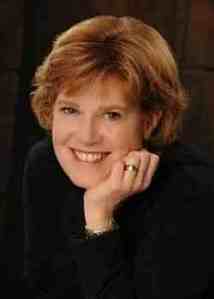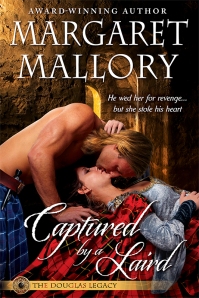Name :MARGARET MALLORY,
Tell us what inspired your new series, THE DOUGLAS LEGACY, and book 1, CAPTURED BY A LAIRD.
I first came across Archibald Douglas when I was doing research for THE GUARDIAN (THE RETURN OF THE HIGHLANDERS). I was intrigued by this handsome, young chieftain’s brazen power play in starting an affair with Scotland’s dowager queen, Margaret Tudor, so soon after the death of her husband, James IV. The affair led to lucrative appointments for his Douglas kin, and his eventual marriage to the queen put the Douglas chieftain in a position to vie for control of the young heir to the throne—and the country. For years, Archibald’s power rose and fell dramatically. He and his closest male relatives were forced to flee the country more than once to save their necks.
This series was born when I began to wonder what happened to the women of the Douglas family who were left behind when the men escaped. While information on Archie’s sisters is sparse, I found enough to suggest they were in serious danger at times. In fact, one sister was eventually burned at the stake in Edinburgh Castle by Archibald’s angry step-son James V.
Being a romance writer, I naturally wanted to give the Douglas lasses happy endings with men who would stand by them in tough times.
CAPTURED BY A LAIRD is a fictional story inspired by the real marriage between Archibald’s sister Alison and David Hume of Wedderburn. As is often the case with Scottish history going back five hundred years, history and legend are intertwined. That said, the real David Hume did capture Blackadder Castle and force Blackadder’s widow, Alison Douglas, to marry him in order to gain the Blackadder lands. I found no mention of David having any illegitimate children, and he and Alison had six children together. From that, I decided to write a story in which they fall in love after their forced marriage. I believe they did. J
What draws readers to Scottish heroes?
Other than the kilt, the big sword, and the oh-so-sexy accent? J The Highland warrior has a larger-than-life quality that makes him great hero material. In today’s world, I may not need—or want—a man who is as forceful and physical as the heroes in my books. But take me to 16th century Scotland in my imagination, and I want that alpha warrior!
A Scottish hero is usually fighting against terrible odds. To survive in his harsh and violent times, he has to be strong, resourceful, and ridiculously courageous. We love this hero for his unfailing courage in facing the powerful forces aligned against him and for his loyalty to his woman, his family, and his clan.
Another bonus is that the Scottish hero is surrounded by strong women who challenge and tease him. Despite how fierce and intimidating he seems to others, his mother and sisters and the old women of his clan all seem ready to set him straight when they think he needs it. And you can be sure that the heroine will have a spirit to match his.
Where to you get your inspiration for your stories?
I get a lot of inspiration from my historical research. Lucky for me, Scottish history is bursting with fascinating characters, murder, and mayhem!
Unfortunately, I can’t travel back in time, but I have been able to travel to Scotland to research my books. Every day I discovered a ruin or a legend I wanted to bring into my stories. For readers who love Scotland, I’ve posted a lot of my photos from my trips on Facebook and on the Videos & Such page of my website www.MargaretMallory.com.
As a historical romance writer, you must do a lot of research.
I’m always researching! Even though I do a lot of research before I started the first book in the series, I’m constantly looking things up while I’m writing. One thing often leads to another, and I’ll come across a legend about a historical character or a ghost story associated with a castle in my book. That’s always fun.
How much does real history play in your books?
Scottish romance readers care about history, but I think what’s more important than accurately reflecting every detail is to make them feel immersed in the time and place of your story. My readers want to be swept away to the Highlands!
I like to ground my stories in real places and historical events, though I feel free to make adjustments to suit the tale. I’ve also used bits of legends and ghost stories associated with castles and other sites that appear in my books. All that is fun for me.
I try to create characters who are true to their times and uniquely Scottish, such as seers, healers, pipers, and clan warriors. There are so many wild true-life characters in Scottish history that I usually include at least a couple of them in each book.
What drew you to Scottish historical romance?
I love history, and I have a serious weakness for stories involving castles and heroes who swing swords. J I suspect I’m drawn to the British Isles, in particular, because of my Scottish-Irish-English heritage.
Why romance?
I love the Happily Ever After. I love that I can do justice and give a Happy-Ever-After to those who deserve it—of course, I make them suffer and earn it first. J I’ve been married many years and am glad of it, but I enjoy writing about that intense, all-consuming, falling-in-love stage of love. Oh, to be young and in love!
What do you want readers to take away from your books?
I have an image in my mind of a woman putting her feet up after a long day and reading my book. The little time she has for herself is precious. My goal is to give her a riveting and emotionally satisfying story that she can get lost in for a few hours. I want to make her laugh, cry, and bite her nails. And when she comes to the end, I want to make her sigh because everything turned out exactly right.
Nothing makes me happier than to hear from readers who tell me they stayed up half the night or had to order pizza for dinner because they couldn’t put my book down.
What are your favorite scenes to write? What are the most difficult?
My favorite scenes to write are the ones that make me weep over my laptop. Seriously. If I’m making myself cry, I know it’s a good scene.
The hardest scenes are the first few in the book. I need to captivate my reader, immerse her in my story, and do it all very quickly. Adding to my troubles, I don’t know my characters as well as I will later in the book.
Which part of writing a book is the most challenging for you?
The first few chapters are always the hardest for me. Always. I need to capture the reader’s attention and immerse her in my story very quickly. I can’t bog things down with backstory, yet I must provide enough information about the characters, setting, and conflict so that the opening scenes are both understandable and compelling. Every word counts so much. I end up doing a lot of revising to make those first chapters work well and flow smoothly. Even deciding where to start is hard—a good book doesn’t start at the logical beginning, but at a high dramatic point when one or both main characters is on the cusp of change. Adding to my troubles, I don’t know my characters as well when I start as I will later in the book.
Every writer dreams of getting “the call.” What were you doing when yours came?
I was in a parking lot an hour and a half from home, and I had just come out of an exhausting, all-day workgroup meeting on high risk kids. Before starting my car, I saw that I had a call from my agent and called her back. She told me that Grand Central was offering me a two-book deal. I was dying to tell someone, but I couldn’t reach a soul. I left a screaming message for my husband, then I had to drive through terrible and seemingly endless road construction and rush hour traffic before I could talk to anyone. It was lucky I didn’t get into an accident!
What is the best writing advice you’ve been given?
In Stephen King’s book, On Writing, he recommends setting daily page or word-count goals. I’m a slow writer, but I am also extremely goal-oriented, so this was great advice for me. When I’m writing my first draft, I set daily, weekly, and monthly word-count goals.
Tell us a bit about your writing process.
I start with the characters and their conflict, and I usually have two or three pivotal scenes in my head. Before I write more than a scene or two, I make character sheets, and I try to have at least a sketchy outline of the plot. I figure out a lot of the plot as I go, but I write better when I know the basic direction I’m headed.
Deciding exactly where to start the story is hard—at least it is for me. A good book doesn’t start at the logical beginning, but at a high dramatic point, with one or both main characters on the cusp of change. The first few chapters are also challenging because I’m still getting to know my characters.
Website http://www.margaretmallory.com/
Amazon page http://www.amazon.com/Margaret-Mallory/e/B002QZQJ5M/ref=ntt_athr_dp_pel_pop_1



IT WAS AN AWESOME BOOK ,LOVED it